|
|
|
Sort Order |
|
|
|
Items / Page
|
|
|
|
|
|
|
| Srl | Item |
| 1 |
ID:
149112
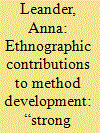

|
|
|
|
|
| Summary/Abstract |
Contrary to common assumptions, there is much to be learned about methods from constructivist/post-structuralist approaches to International Relations (IR) broadly speaking. This article develops this point by unpacking the contributions of one specific method—ethnography—as used in one subfield of IR—Critical Security Studies. Ethnographic research works with what has been termed a “strong” understanding of objectivity. When this understanding is taken seriously, it must lead to a refashioning of the processes of gathering, analyzing, and presenting data in ways that reverse many standard assumptions and instructions pertaining to “sound methods.” Both in the context of observation and in that of justification, working with “strong objectivity” requires a flexibility and willingness to shift research strategies that is at odds with the usual emphasis on stringency, consistency, and carefully planned research. It also requires accepting that the engagement of the researcher with the researched is no regrettable inevitability but a potential to be used and mobilized. If these arguments were more widely acknowledged, it would be easier to justify/recognize the methodological foundations of research in the ethnographic tradition. However, it would also require rethinking standard methods instructions and the judgments they inform.
|
|
|
|
|
|
|
|
|
|
|
|
|
|
|
|
| 2 |
ID:
167413
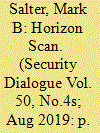

|
|
|
| 3 |
ID:
101000
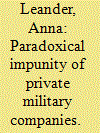

|
|
|
|
|
| Publication |
2010.
|
| Summary/Abstract |
The impunity of private military companies (PMCs) appears increasingly puzzling. Not only is there widespread awareness and public debate about violations of the spirit - if not the letter - of the law; there is also a 'mad scramble' to improve regulation. In spite of this, legal accountability remains problematic. This situation is usually explained either as an expression of the techno-legal difficulties created by the move from government to governance or as reflecting the social, political and economic capital of PMCs. By contrast, this article suggests that the paradox of PMC impunity is best understood by reference to the particular form of authority such organizations enjoy - that is, by reference to their 'symbolic' capital. The article shows that PMC authority is grounded in three interrelated discourses/practices relative to risk/security, market governance and exercise of the state's monopoly on violence. These leave an imprint on the legal accountability sought. The centrality of the risk/security discourse paves the way for exceptionalism; that of the role of market governance for ad-hocism; and that of the discourse of respect for the state's monopoly on violence for inconsequentialism. The result is the coexistence of PMCs' relative impunity with intense contestation and legal innovation.
|
|
|
|
|
|
|
|
|
|
|
|
|
|
|
|
| 4 |
ID:
141463


|
|
|
|
|
| Summary/Abstract |
Critical scholarship on the camp tends to focus on the institution’s historical role in producing forms of social exclusion often by linking the emergence of the camp to the creation of abstract political divisions such as citizenship and nationality. While this approach has unquestionable value, it overemphasizes the importance of social constructions in the history and development of the camp. This article calls for a re-examination of the material elements composing camp spaces by offering attention to how non-human entities and processes contribute to the development of practices of confinement, security and governance. Drawing on the work of Manuel DeLanda, Gilles Deleuze, and Félix Guattari, this article develops an outline of the camp as a material assemblage and examines how the camp emerges from the interaction of barbed wire, war, and the rise of motorized transport. This process of historical emergence helps to explain the elastic and transient dimensions of the camp as constitutive of a new form of fluid political control. Moreover, the article claims that attending to the materiality of the camp helps to explain the expanding role that camps will play in the future of political governance.
|
|
|
|
|
|
|
|
|
|
|
|
|
|
|
|
| 5 |
ID:
141782


|
|
|
|
|
| Summary/Abstract |
Critical scholarship on the camp tends to focus on the institution’s historical role in producing forms of social exclusion often by linking the emergence of the camp to the creation of abstract political divisions such as citizenship and nationality. While this approach has unquestionable value, it overemphasizes the importance of social constructions in the history and development of the camp. This article calls for a re-examination of the material elements composing camp spaces by offering attention to how non-human entities and processes contribute to the development of practices of confinement, security and governance. Drawing on the work of Manuel DeLanda, Gilles Deleuze, and Félix Guattari, this article develops an outline of the camp as a material assemblage and examines how the camp emerges from the interaction of barbed wire, war, and the rise of motorized transport. This process of historical emergence helps to explain the elastic and transient dimensions of the camp as constitutive of a new form of fluid political control. Moreover, the article claims that attending to the materiality of the camp helps to explain the expanding role that camps will play in the future of political governance.
|
|
|
|
|
|
|
|
|
|
|
|
|
|
|
|
| 6 |
ID:
134149
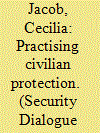

|
|
|
|
|
| Publication |
2014.
|
| Summary/Abstract |
Inspired by the practice turn in the field of international relations, this article contributes to the growing interest in the sociological and potentially transformative nature of the concept of human security, with a specific emphasis on the protection of civilians affected by armed conflict. Drawing on fieldwork conducted in Cambodia and Myanmar on the protection of children affected by armed conflict, it argues for a fresh analysis of human security through the lens of a 'politics of protection'. By mapping the work of international, government, and non-governmental actors involved in the protection of conflict-affected populations, the article shows that the distinction between welfare/development-oriented approaches and security-oriented approaches creates a protection gap for vulnerable populations in practice. This brings into question the salience of a security-development nexus conceptualization of human security. Instead, a politics of protection lens offers an alternative starting point for the study of security practices in conflict-affected societies, and facilitates a reconceptualization of human security as a transformative approach to contesting the politics and practice of civilian protection.
|
|
|
|
|
|
|
|
|
|
|
|
|
|
|
|
| 7 |
ID:
115309


|
|
|
|
|
| Publication |
2012.
|
| Summary/Abstract |
In this paper, selected episodes of the 2005 series of the BBC science fiction television show Doctor Who are used to discuss self/other identity formulations, in terms of how "we" relate to those considered different. I shall examine how Doctor Who represents threats and dangers and relate this to how we can use such understandings to learn, discuss, and critique conventional understandings of security in International Relations (IR). Popular culture texts such as Doctor Who provide examples of how difference is often conceptualized as a threat to be eliminated. At the same time, Doctor Who also gives space to question and critique these understandings of "others" as threats, especially in its illustrations of the location of threats, its shifting perspective, and its centralization of a nonhuman as its protagonist. As such, Doctor Who points toward theorizing world politics in which the self = good/others = threats dichotomy can be questioned and opens up new ways of engaging with those considered different.
|
|
|
|
|
|
|
|
|
|
|
|
|
|
|
|
| 8 |
ID:
154071
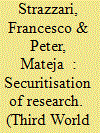

|
|
|
|
|
| Summary/Abstract |
Knowledge on conflict-affected areas is becoming increasingly important for scholarship and policy. This article identifies a recent change in knowledge production regarding 'zones of danger', attributing it not only to the external environment, but also to an on-going process of securitisation of research resulting from institutional and disciplinary practices. Research is increasingly framed by security concerns and is becoming a security concern in itself, although the implications are not readily acknowledged. To illustrate these developments, we draw on fieldwork in Mali and Darfur.
|
|
|
|
|
|
|
|
|
|
|
|
|
|
|
|
| 9 |
ID:
085435
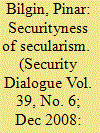

|
|
|
|
|
| Publication |
2008.
|
| Summary/Abstract |
Secularism is frequently portrayed as a security referent in present-day Turkey. But, what is it that makes secularism a security issue? Where are we to locate the `securityness' of secularism? Against prevailing accounts that privilege the domestic dimension, this article argues that the securityness of secularism in Turkey should be located in both the domestic and the international. This is not to suggest that secularism can be reduced to security, but it is to suggest that efforts to portray Turkey's secularism merely as a constitutive principle and an outcome of the project of Republican transformation, or as a means of safeguarding a particular vision of transformation through controlling religion, or as an instrument of national economic development, while rewarding in themselves, nevertheless miss an important set of dynamics that help to explain secularism's centrality to Turkey's politics.
|
|
|
|
|
|
|
|
|
|
|
|
|
|
|
|
| 10 |
ID:
106788


|
|
|
|
|
| Publication |
2011.
|
| Summary/Abstract |
The Bush Administration's 'war on terror' was both a set of policies as well as a powerful security narrative that informed the way that threat was understood and constructed post-9/11. This idea is explored specifically with regard to how the articulation of threat in the 'war on terror' informed American relations with Southeast Asia, which in turn had active consequences for regional state and non-state actors alike. The importance of discourse is explained with a focus on how the discursive construction of threat within the 'war on terror' security narrative is intrinsic to the 'security project' of the American state, as well as to American national identity more generally (Campbell 1998, Jackson 2005). From this analytical perspective, this paper contends that irruptions of the Bush Administration's post-9/11 foreign policy discourse in Southeast Asia were observable, and that these manifestations of discursive construction engendered consequences that contributed to an increase in anti-Americanism and terrorist activities aimed at 'Western' targets, and to a proliferation of anti-democratic and repressive behaviors by Southeast Asian governments under the guise of anti-terror measures.
|
|
|
|
|
|
|
|
|
|
|
|
|
|
|
|
|
|
|
|
|